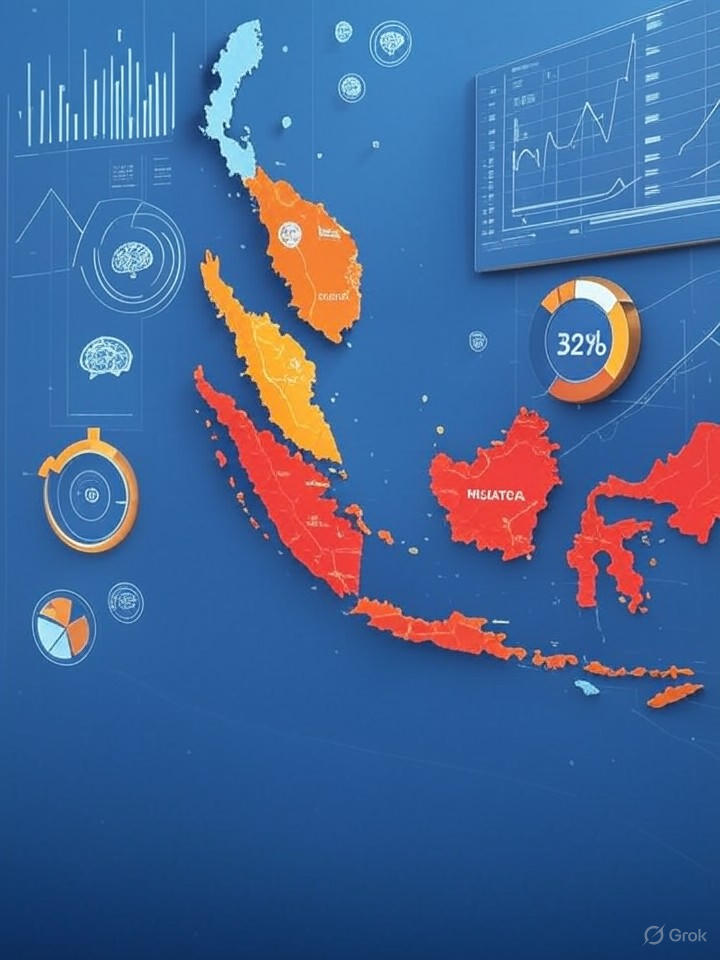Malaysia Leads Southeast Asia in AI Investment as OpenAI Expands Data Residency Options
The Southeast Asian digital landscape is transforming at breakneck speed, and two major developments are capturing headlines in early 2025. The first is Malaysia’s impressive rise as a regional artificial intelligence (AI) powerhouse, now accounting for 32% of all AI funding in Southeast Asia. The second is OpenAI’s new expansion of data residency options for ChatGPT Enterprise, ChatGPT Edu, and the OpenAI API Platform—an initiative aimed at enhancing data governance and regional compliance worldwide.
Malaysia’s Rapid Ascent in the AI Landscape
According to the latest e-Conomy SEA 2025 report, Malaysia is positioning itself as a central hub for AI innovation, research, and entrepreneurship. The country’s success is largely attributed to a deliberate national strategy combining public-private partnerships, government incentives, and a strong focus on digital upskilling.
In 2025, Malaysia’s share of AI funding grew significantly, outpacing regional giants like Singapore, Indonesia, and Thailand. Capturing 32% of total AI funding reflects not only investor confidence but also the nation’s readiness to integrate cutting-edge technologies across sectors.
The Role of Government Initiatives
The Malaysian government’s coordinated approach towards establishing a dynamic AI ecosystem has borne remarkable results. Programmes under the National AI Strategy, launched in collaboration with agencies such as MDEC and MOSTI, have fostered cross-industry collaboration and attracted international investors seeking stable growth markets within ASEAN.
Tax incentives, AI innovation sandboxes, and the development of AI-ready infrastructure—like Malaysia’s emerging data centers and cloud storage networks—have become critical in sustaining this momentum. These structural reforms are designed to help Malaysia achieve its ambition of becoming one of the top regional data and AI processing centers by 2030.
Key Industries Benefiting from AI Integration
Malaysia’s AI investments are making a tangible difference across multiple industries:
- Manufacturing and Industry 4.0: AI-driven automation is improving efficiency and reducing costs, making Malaysian factories more competitive globally.
- Healthcare: Predictive analytics is being used in patient diagnostics, medical imaging, and personalized healthcare solutions.
- Finance and Fintech: AI is driving innovation in fraud detection, risk management, and financial modeling.
- Education: Edtech startups are leveraging AI to personalize learning outcomes and bridge gaps in digital literacy.
These sectors are collectively attracting investments from a growing network of venture capital firms, foreign investors, and regional partners eager to tap into Malaysia’s increasingly tech-driven economy.
The Broader Context: Southeast Asia’s Digital Economy Boom
The remarkable growth in AI funding is part of a larger trend within the Southeast Asian digital economy. The e-Conomy SEA 2025 report predicts that the region’s internet economy will surpass USD 300 billion by 2025, driven by increased e-commerce activity, digital payments, and a thriving startup ecosystem. The report also identifies a surge in enterprise digital transformation initiatives powered by AI, cloud technologies, and data analytics.
Malaysia’s progress has contributed to a regional ripple effect. As more Southeast Asian nations implement AI-friendly regulations and integrate emerging technologies into their economies, investors are showing renewed confidence in the long-term sustainability of the region’s digital transformation.
OpenAI Expands Data Residency for Enterprise and Education Clients
While Malaysia strengthens its hold on AI development in Southeast Asia, OpenAI is addressing one of the biggest global challenges in technology adoption—data sovereignty. In a landmark move, OpenAI has expanded its data residency options for organizations using ChatGPT Enterprise, ChatGPT Edu, and its API Platform. Eligible customers can now choose to store their data at rest within specific geographic regions, offering better compliance with data privacy laws such as the EU’s GDPR and similar frameworks in Asia-Pacific.
Why Data Residency Matters
Data residency—the process of storing and processing data within a defined geographical boundary—has become critical for businesses that handle sensitive or regulated data. With governments worldwide tightening data protection standards, global software providers must adapt their infrastructure to regional compliance expectations.
For enterprises and educational institutions using ChatGPT products, OpenAI’s new policy represents a significant step toward data security, transparency, and user control. By enabling localized storage, organizations can better align with national legislative requirements while ensuring data remains encrypted and shielded from cross-border access issues.
Impact on Businesses and Educational Institutions
OpenAI’s expanded data localization features are particularly beneficial for sectors such as:
- Education: Universities adopting ChatGPT Edu can now manage AI-assisted learning securely under local academic data policies.
- Finance: Financial institutions subject to strict data governance frameworks can integrate ChatGPT tools into operations without violating local storage laws.
- Healthcare: Hospitals and research institutions gain peace of mind by storing patient data and analysis outputs within regional data centers.
This shift reflects a larger industry trend in which companies prioritize ethical AI deployment, data accountability, and user privacy as key drivers of innovation.
How Malaysia Can Benefit from OpenAI’s Expansion
Malaysia’s growing status in the AI sector uniquely positions it to leverage OpenAI’s commitment to data localization. As the country collaborates with international technology providers and cloud infrastructure companies, new opportunities will emerge in hosting, cybersecurity, and enterprise solutions tailored to regional markets.
With its expanding digital infrastructure and commitment to responsible data management, Malaysia could soon attract even more global tech businesses looking to base their data operations within compliant and efficient environments in Asia-Pacific.
Synergy Between Local AI Growth and Global Data Policies
The combination of Malaysia’s dominance in AI funding and OpenAI’s renewed emphasis on regional data residency signals a broader regional integration of AI innovation and governance. This alignment not only bolsters investor confidence but also encourages transparent and ethical AI adoption across industries.
Looking Ahead: The Future of AI and Data Governance in Southeast Asia
As AI continues to mature, Southeast Asia’s economic and technological prospects look brighter than ever. Countries such as Malaysia, Singapore, and Vietnam are building frameworks to attract AI research while addressing ethical concerns, data localization challenges, and sustainable development goals.
The path forward is clear: policies focused on equitable AI growth and data transparency are becoming central to national strategies. Public trust, corporate responsibility, and regional collaboration are now inseparable from the AI innovation journey.
Conclusion: A Converging Future for AI Funding and Data Innovation
Malaysia’s rise as a leader in AI investment and OpenAI’s global data residency expansion both signify a new phase in the digital transformation of Southeast Asia. As the e-Conomy SEA 2025 report makes clear, the region’s potential lies not only in developing sophisticated AI applications but also in ensuring that data management and governance frameworks evolve to support secure, ethical, and scalable innovation.
In the years ahead, the synergy between rapid AI funding growth and advanced data residency solutions could redefine the global digital economy—from Kuala Lumpur to Silicon Valley. As demand for localized AI-driven solutions increases, Malaysia and Southeast Asia stand ready to lead the charge toward a smarter, safer, and more connected digital future.











